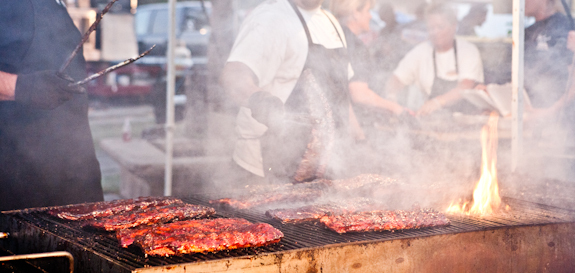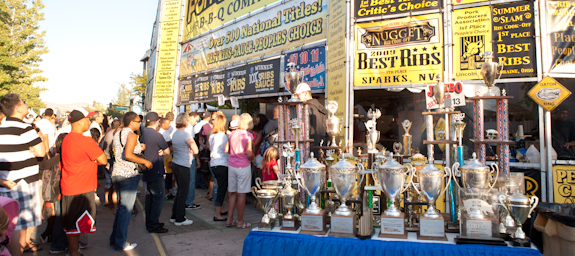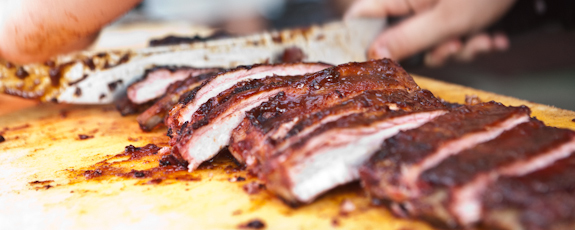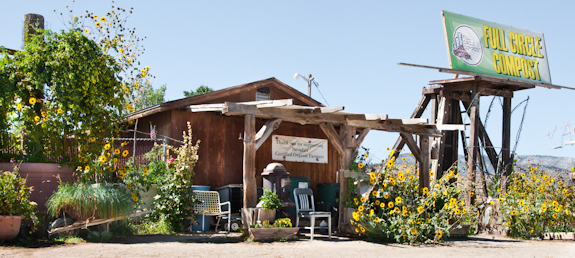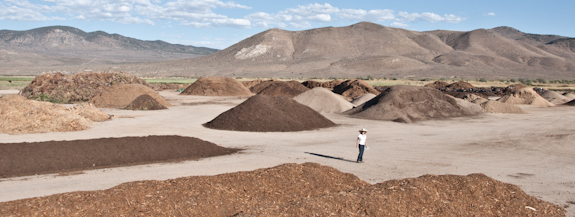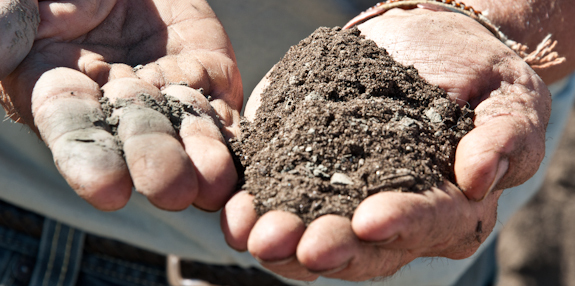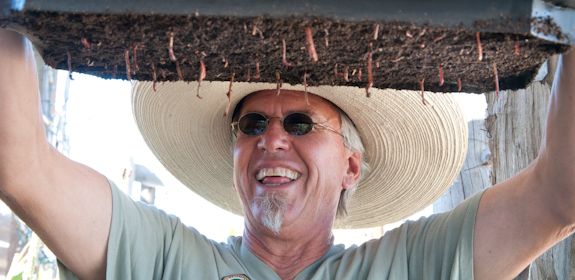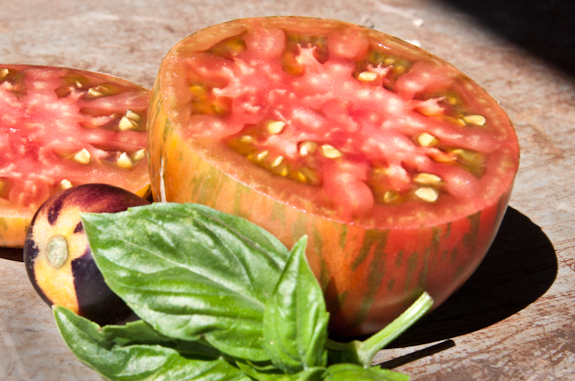Co-Authored by Lee Glenn
Photography: Julie Ann Fineman & Lee Glenn
We're back in Reno -- remember GirlFarm? -- but this time traveling back to our desert home after six weeks on the road. With so many compelling stories, we hardly expected to find yet another, or two in one... but then we're getting ahead of ourselves.
A newspaper article about recycling, a personal tip and an interview leads us to... no kidding: The 24th Annual Best in the West Nugget Rib Cook-Off. A master display of pork consumption, 238,000 pounds of ribs, a draw of 500,000 people for six days over Labor Day weekend, the biggest in the country. Billowing smoke fills the streets, with a line-up of crowds bent on eating as much BBQ as possible. BBQ from the world's best BBQ cooking teams, gathered next to the Nugget Casino grounds to compete for prizes and rib-glory.
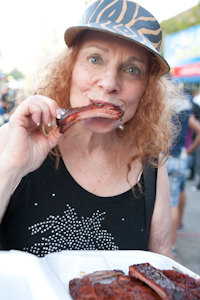 We had to know where all this PORK comes from. It turns out that the Nugget organizes the event so that all competitors buy the same cut of meat, from the same distributor, from the same producer, Seaboard Farms, a competitive leveler no doubt. Curious about Seaboard's standards of animal welfare, we checked out their website, we called Seaboard, we called their third party animal welfare auditor. Julie was salivating to share all the information from these conversations, how many pigs does it take to make 238,000 pounds of ribs, how are the animals bred, cared for, managed, fed, slaughtered, what is the environmental impact... too complex to add but a great follow-on story. Stay tuned.
We had to know where all this PORK comes from. It turns out that the Nugget organizes the event so that all competitors buy the same cut of meat, from the same distributor, from the same producer, Seaboard Farms, a competitive leveler no doubt. Curious about Seaboard's standards of animal welfare, we checked out their website, we called Seaboard, we called their third party animal welfare auditor. Julie was salivating to share all the information from these conversations, how many pigs does it take to make 238,000 pounds of ribs, how are the animals bred, cared for, managed, fed, slaughtered, what is the environmental impact... too complex to add but a great follow-on story. Stay tuned.
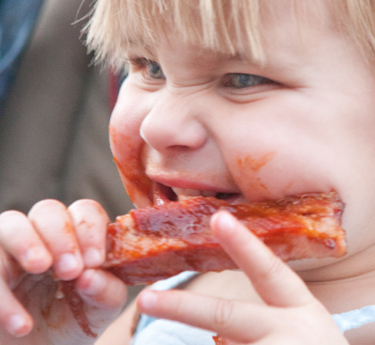 For now though, it's not pork consumption that's the story, well, okay, some of the story includes significant pork consumption, but the sustainable story is about what's not consumed. That story is about the trash, ton's of plates, napkins, boxes, plastic utensils, cans, bottles, beans, bread and all those bones that have to find their way off the grounds every day. For that story, we went to casino owner Steve Ascuaga.
For now though, it's not pork consumption that's the story, well, okay, some of the story includes significant pork consumption, but the sustainable story is about what's not consumed. That story is about the trash, ton's of plates, napkins, boxes, plastic utensils, cans, bottles, beans, bread and all those bones that have to find their way off the grounds every day. For that story, we went to casino owner Steve Ascuaga.
"15 years ago, we were drowning in cardboard," he explains. "So our operations people instigated a program to recycle the rib boxes." The Cook-Off began with the cardboard, but got serious 10 years ago. "We started looking for what more we could do without biting off the whole apple," Steve adds.
With an idea from local master composter Craig Witt and and Keep Truckee Meadows Beautiful non-profit, the Nugget developed a composting program. Within the Rib Village, a VIP area with unlimited ribs controlled by the Nugget, all plates, cups, utensils and napkins are made of compostable materials. Each day, along with the food waste, the Village trash is collected and hauled off to be composted. It's not 100% of the mountains of trash generated by the individual cooking vendors, but it's a significant contribution as opposed to just dumping into the landfill.
We still have to pay to haul the trash from the Village, but composting it is probably less than taking it to the landfill. We're shrinking the footprint of the garbage," is Steve's business and progressive reasoning for the program. Sadly, Craig's business, Full Circle Compost, didn't become part of the final plan... but more about him and his commitment to composting later.
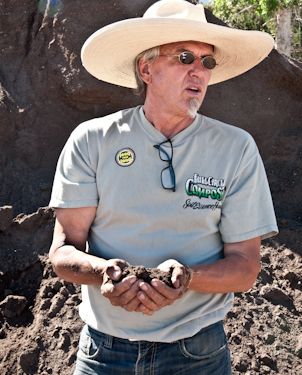 Oddly, it was the organic material that was the original stumbling block, namely the rib bones, lots and lots of rib bones. Eventually though, The Nugget Casino contracted Castaways to take the bones too and the composting program was up and running.
Oddly, it was the organic material that was the original stumbling block, namely the rib bones, lots and lots of rib bones. Eventually though, The Nugget Casino contracted Castaways to take the bones too and the composting program was up and running.
Which brings us full circle to master composter Craig Witt of Full Circle Compost in Minden, Nevada, a man who turns table scraps into soil riches. His black gold is compost, a rich organic matter that feeds your food." For Craig real medicine, real health starts with a nutrient dense soil. He is speaking Julie's language on soil fertility, a subject close to her heart.
A day after digesting the Cook-Off, Craig tours us through his shop and property, where truck loads of fresh compost are being picked up by gardeners and farmers alike to feed their crops. In the historic Carson Valley, the garden spot of Nevada which once fed the gold rush, he is creating loads of new gold for the health of the valley's soil.
Craig pays to gather waste from the entire region, including tons of un-eaten pancakes from the federal prison and spoiled produce from Walmart, Whole Foods and Costco. He has created row upon row of smoldering compost by renting space on the expansive prison grounds and paying inmates to work the composting process... separating, spreading, piling, turning, loading.
Craig talks lovingly about the soil's crumb structure: "The soil should be loose, not compact and have a dark rich brown color like coffee grounds and be aromatic like the forest floor."
Also a vermiculturist, Craig's worms play an important role in composting by "...letting the worms complete the work for you." The worm's digestive process creates a biotic bath rich in nutrients and sanitizes the soil by eating the pathogens harmful to our health.
"Worms are the sanitizers of the planet," he notes as he digs into a worm bin to show the critters at work. He turns the worm castings into a formula, Worm Wine, a nutrient dense, disease resistant, drink for anything grown in the ground.
As he describes it: "What colostrum from mother's milk is to fortifying the immune system of a newborn, Worm Wine does for a seedling when it emerges from dormancy."
"The most important thing I can say today is that compost is a verb," Craig concludes.
Captured by the action in that sentiment, Julie was pining to take a worm bin home. Simplicity, patience, re-purposing food waste to feed the worms captivated her. In a few months, feeding the castings to her veggie garden was a vision. Lee though, wouldn't have it. He couldn't imagine sharing the house with the worms since they would have to be under the kitchen sink or in the shower or somewhere inside due to the heat of the desert summer. For a day or two, the relationship was challenged over this impasse. Eternally the optimistic, Julie is still hoping for a change of heart.
P.S. Craig's other passion is growing heirloom tomatoes. Craig hosts the annual TomatoFest on September 21. It's worth the trek...

